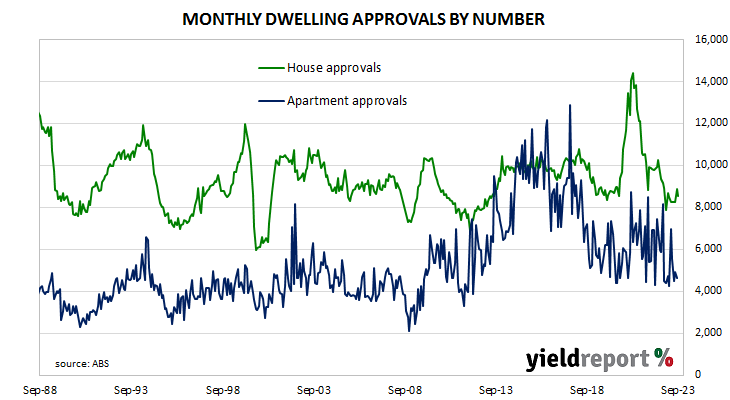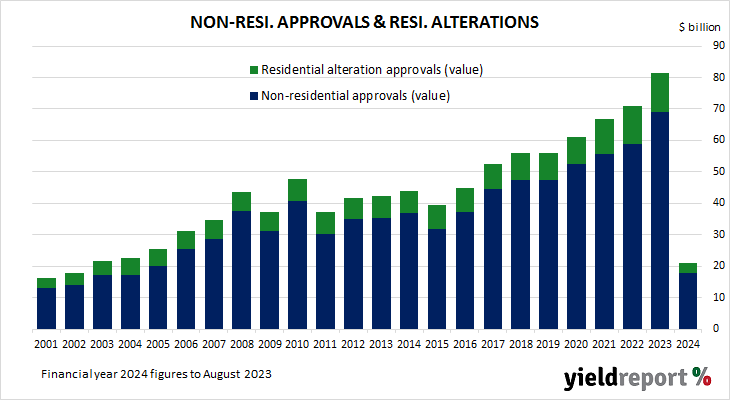Home approval numbers down 4.6% in September, contrasts with expected gain; 22.3% lower than September 2022; Westpac: moderately soft set of results, at low levels by historical standards; ACGB yields up modestly; rate-rise expectations firm a touch; house approvals down 4.0%, apartments down 5.8%; non-residential approvals down 7.2% in dollar terms, residential alterations up 0.7%.
Building approvals for dwellings, that is apartments and houses, headed south after mid-2018. As an indicator of investor confidence, falling approvals had presented a worrying signal, not just for the building sector but for the overall economy. However, approval figures from late-2019 and the early months of 2020 painted a picture of a recovery taking place, even as late as April of that year. Subsequent months’ figures then trended sharply upwards before falling back through 2021, 2022 and the first half of 2023.
The Australian Bureau of Statistics has released the latest figures from September which show total residential approvals fell by 4.6% on a seasonally-adjusted basis. The result contrasted with the 2.5% gain which had been generally expected as well as August’s 8.1% gain after revisions. Total approvals fell by 22.3% on an annual basis, down from the previous month’s revised figure of -20.6%. Monthly growth rates are often volatile.
“Overall, the September update showcased a moderately soft set of results, at a time where signs of an underlying stabilisation in dwelling approvals have begun to emerge, albeit at low levels by historical standards,” said Westpac economist Ryan Wells. “That said, the outlook for dwelling approvals remains mixed; just as wider housing markets are benefitting from rapid population growth, legacy issues around elevated construction costs and capacity constraints remain a drag on building activity.”
Commonwealth Government bond yields rose modestly on the day, lagging overnight movements of US Treasury yields. By the close of business, the 3-year ACGB yield had crept up 1bp to 4.44%, the 10-year had gained 2bps to 4.97% while the 20-year yield finished 1bp higher at 5.30%.
In the cash futures market, expectations regarding further rate rises firmed a touch. At the end of the day, contracts implied the cash rate would increase from the current rate of 4.07% to average 4.20% through November, 4.285% in December and 4.375 in February. May 2024 contracts implied a 4.505% average cash rate while August 2024 contracts implied 4.515%, 45bps more than the current rate.
Approvals for new houses fell by 4.0% over the month, in contrast with August’s 7.5% gain after revisions. On a 12-month basis, house approvals were 11.4% lower than they were in September 2022, up from August’s comparable figure of -13.5%.
Apartment approval figures are usually a lot more volatile and September’s total fell by 5.8% after a 9.2% gain in August. The 12-month growth rate rose from August’s revised rate of -34.3% to -33.4%.
Non-residential approvals decreased by 7.2% in dollar terms over the month but were 2.1% higher on an annual basis. Figures in this segment also tend to be rather volatile.
Residential alteration approvals increased by 0.7% in dollar terms over the month and were 2.6% higher than in September 2022.



